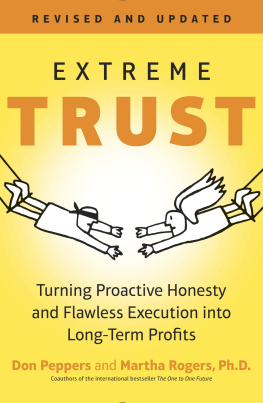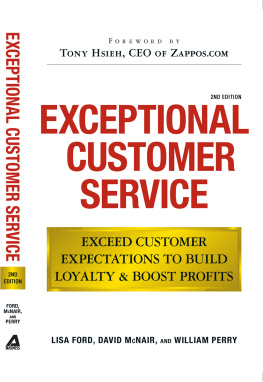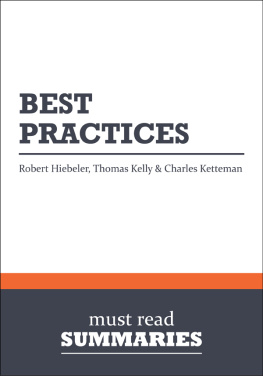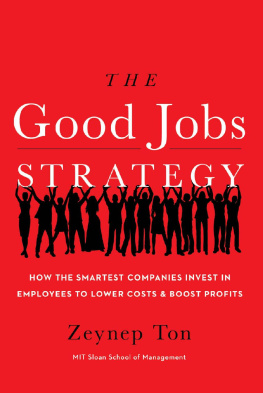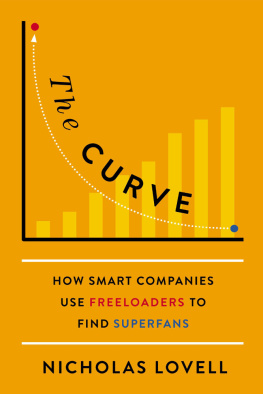ADDITIONAL BOOKS BY DON PEPPERS AND M ARTHA ROGERS , Ph.D .
The One to One Future
Enterprise One to One
The One to One Fieldbook
(with Bob Dorf)
The One to One Manager
One to One B2B
Return on Customer
Rules to Break and Laws to Follow
Managing Customer Experiences and Relationships
(reference and textbook, 3rd edition)
PORTFOLIO / PENGUIN
An imprint of Penguin Random House LLC
375 Hudson Street
New York, New York 10014
penguin.com
First published by Portfolio / Penguin, a member of Penguin Group (USA) Inc. 2012
This revised edition published 2016
Copyright 2012, 2016 by Don Peppers and Martha Rogers
Penguin supports copyright. Copyright fuels creativity, encourages diverse voices, promotes free speech, and creates a vibrant culture. Thank you for buying an authorized edition of this book and for complying with copyright laws by not reproducing, scanning, or distributing any part of it in any form without permission. You are supporting writers and allowing Penguin to continue to publish books for every reader.
Ebook ISBN: 9781101561270
LIBRARY OF CONGRESS CATALOGING-IN-PUBLICATION DATA
Names: Peppers, Don, author. | Rogers, Martha, 1952 author.
Title: Extreme trust : turning proactive honesty and flawless execution into
long-term profits / Don Peppers and Martha Rogers, Ph.D.
Description: Revised edition. | New York : Portfolio/Penguin, [2016] |
Includes bibliographical references and index.
Identifiers: LCCN 2016007808 | ISBN 9780143108559
Subjects: LCSH: Business ethics. | Customer relationsManagement. | Trust. |
Honesty.
Classification: LCC HF5387 .P434 2016 | DDC 174/.4dc23
While the authors have made every effort to provide accurate telephone numbers, Internet addresses, and other contact information at the time of publication, neither the publisher nor the authors assume any responsibility for errors or for changes that occur after publication. Further, the publisher does not have any control over and does not assume any responsibility for author or third-party websites or their content.
Cover design: Dan Donahue
Cover concept: Annette Webb
Cover illustration: Igor Kopelnitsky/Illustration Source
Version_4
Contents
1
Trustability: Not Just a Good Idea. Inevitable.
Chapter 1
Yesterday, Trustworthy Was Good Enough . Today, Only Trustability Will Do.
Play fair. Immediately after the first Gulf War in 1991, USAAthe insurance and banking company based in San Antonio, Texassent out refund checks to several thousand customers, called members by USAA. The idea was that since the men and women who had been serving at the front couldnt drive their cars back in the United States during the several months they were posted in the Middle East, USAA suspended the charges for the premiums during the time soldiers were overseas and sent out unsolicited refunds once the military personnel got home. USAA consistently comes out as the most trusted financial services organization in the United States, and customers believe USAA will always do whats right for them, never oversell them, and always be there for them when a member needs the company. The company was originally established to serve current and former U.S. military officers, but today USAA serves everyone, although not everyone is eligible for every product offered. Once you become a member, however, your children can also become USAA members, and USAAs loyal customer base now runs into the third generation. The employee culture at USAA is based on a simple idea: Treat the customer the way youd want to be treated if you were the customer.
And as for those refund checks? Nearly 2,500 of them were sent back to USAA by grateful customers who told USAA to keep the money and just be there when we need you.
Imagine for a moment that you run any other bank or insurance company in the United States.
How will you compete against a financial services institution that customers love so much they sometimes refuse to accept refunds and are loyal into the third generation and counting?
Whats the difference between USAA and the other financial services companies we all know about? Many of those companies, with names familiar to customers around the world, are not bad companies. On the contrary: Their officers are ethical. Their legal departments make sure they dont break any laws. They issue privacy policies and policy statements of all kinds, and then for the most part they do exactly what they say theyre going to do. And yet none of usnot even the executives of these well-run institutionscould imagine customers refusing to take refunds from those companies. The companies are lucky if a customer keeps doing business for several years, and they dont even think about multigenerational loyalty. What is the difference?
Most businesses today consider themselves to be trustworthy, and by yesterdays standards they are. They post their prices accurately, they try to maintain the quality and reliability of their products, and they generally do what they say theyre going to do. But thats as far as most businesses go, and by tomorrows standards it wont be nearly good enough. Not even close.
The fact is that far too many businesses still generate substantial profits by fooling customers, or by taking advantage of customer mistakes or lack of knowledge, or simply by not telling customers what they need to know to make informed decisions. They dont break any laws, and they dont do anything overtly dishonest. But think for a minute about the standard, generally accepted way some industries have made money for the past several decades:
To credit card companies, a marginally sophisticated borrower who can never resist spending, rolls his balance from month to month, and often incurs late fees is considered a most valuable customer. The common industry term for a credit card user who dutifully pays his bill in full every month is deadbeat.
Mobile phone carriers profit from customers signing up for more expensive calling plans than their usage requires, and from roaming and data services accessed by accident.
Retail banks make a substantial portion of their operating profit from overdraft charges and other fees assessed for what are usually just simple customer errors.
Some merchandise offered in pop-ups and on late-night TV is worth very little but hooks buyers into paying a little money to have their names and contact information loaded onto a mailing list, which is the truly profitable product sold by the direct marketing company.
Even today the overwhelming majority of companies dont allow customers to post product or service reviews on their own websites.

